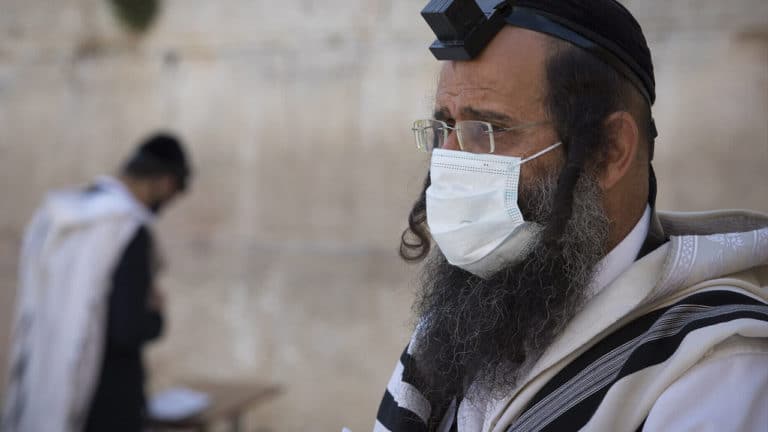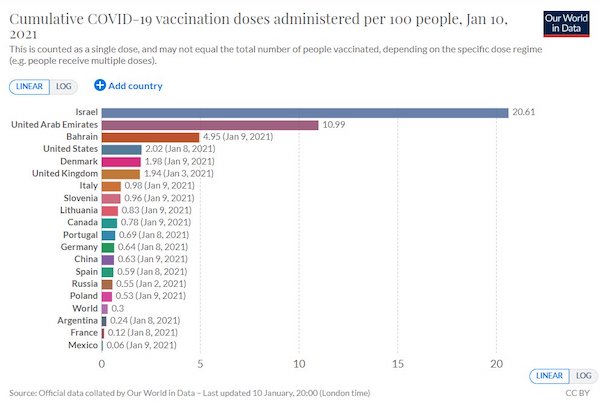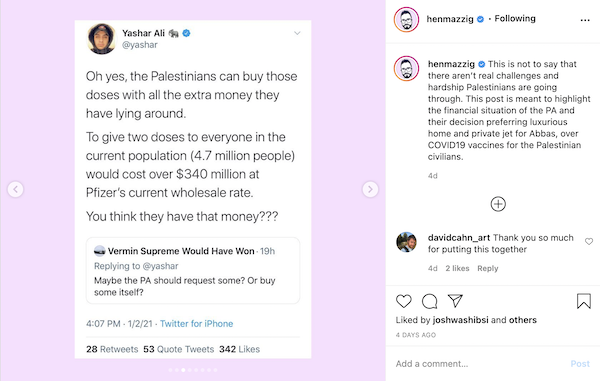
Israel currently leads the world by a wide margin in coronavirus vaccinations per capita. The Jewish state administered the first doses of the vaccine to more than 10% of its population in just two weeks.
Approximately three weeks after it began its vaccine drive, as of January 10, 2020, Israel had vaccinated 20.61% of its population, a significantly higher figure compared to every other country. Behind Israel were the United Arab Emirates (10.99%), Bahrain (4.95%) and the United States (2.02%).

Just as Israel was receiving praise for its vaccination drive, criticism emerged over access for Palestinians living in the West Bank and Gaza. The Guardian published a story with the headline, “Palestinians excluded from Israeli Covid vaccine rollout as jabs go to settlers,” while NPR ran an article titled, “As Israel leads in Covid-19 vaccines per capita, Palestinians still await shots.”
Additionally, the NGO Amnesty International, based in the United Kingdom, called on Israel to deliver vaccines to Palestinians in the West Bank and Gaza in a harshly worded piece. The group wrote that Israel needs to “stop ignoring its international obligations as an occupying power and immediately act to ensure that Covid-19 vaccines are equally and fairly provided to Palestinians living under its occupation in the West Bank and the Gaza Strip.”
Israel’s health minister Yuli Edelstein said Israel would deliver vaccines to its own citizens first, and that although Israel has no legal obligation to provide vaccines for Palestinians, there is “no doubt it will be done” as soon as Israel is “in a position to help others.” The Palestinian Authority (PA) had not requested help from Israel in obtaining vaccines until last week. In response, Israel sent them a small number of vaccines.
Under international law, whose responsibility is it to provide the vaccines to Palestinians? Is the criticism leveled against Israel legitimate, or is the Jewish state being unfairly portrayed as preventing Palestinians from getting vaccinated? Does Israel have a moral obligation to vaccinate Palestinians, beyond international law?
Is Israel Responsible for Vaccinating Palestinians Against Covid-19?
Under the Oslo Accords, signed in the 1990s between Israel and the Palestine Liberation Organization (PLO), the West Bank was divided into three areas: Area A, B, and C. The three jurisdictions were originally intended to be temporary until a resolution between Israel and the Palestinians was achieved. However, that final agreement still hasn’t happened, and the map continues to be divided into three areas. Here is a breakdown of the jurisdictions:
- Area A is under PA control and is home to only Palestinian residents. The PA is responsible for providing health services in this area.
- Area B is under joint PA-Israeli control. The PA controls education, health and the economy, while Israel has security control, with certain exceptions where the PA has limited security control.
- Area C is under Israeli control, and, though it is sparsely populated, has both Palestinian and Israeli residents. Israeli cities and towns in the West Bank are known as settlements, and they are all located in Area C.
There is a debate about whether Israel is obligated to provide vaccinations to Palestinians under international law, based on different interpretations of the Oslo Accords.
According to reporting from The Jerusalem Post, “under article 17 of the Oslo Accords, the Palestinian Authority is responsible for healthcare, including vaccines, for Palestinians in the West Bank and Gaza.” Israeli officials have cited the accords to argue that Palestinian leadership bears the responsibility for vaccines.
However, Michael Koplow, policy director of the Israel Policy Forum, said in an email that healthcare stipulations in Oslo apply only to Areas A and B, noting that Area C was supposed to be negotiated over five years after Oslo was signed.
“Under Oslo, Israel absolutely and indisputably is responsible for providing healthcare to Palestinians in Area C,” Koplow said. “The Palestinian Authority has no jurisdiction in Area C whatsoever and Israel retains full administrative control, and therefore the obligations rests solely on the Israeli government.”
He added that the same is true for East Jerusalem, which has been under Israeli control since the 1967 Six-Day War.
Scott Lasensky, a visiting professor of Israel and Jewish studies at the University of Maryland, said in an email that Israel bears partial responsibility, writing, “Precedent, common sense, international law and Israel’s own initial response to the pandemic all illustrate that Israel shoulders some degree of responsibility for the public health situation in the Palestinian territories,” including delivering the vaccines.
Additionally, some argue that the Fourth Geneva Convention requires Israel to provide healthcare to Palestinians in the entire West Bank and in the Gaza Strip. Article 56 of the Convention states that an “occupying power” is responsible for providing medical services for the local population, as well as “preventive measures necessary to combat the spread of contagious diseases and epidemics.”
The Times of Israel, like The Jerusalem Post, reported that the PA is responsible for providing health services to Palestinians under the Oslo Accords.
Diverse Perspectives From Jewish Leaders
Jewish leaders expressed a range of views about Israel’s obligation to provide vaccines for Palestinians.
Hen Mazzig, an Israeli activist and senior fellow at the Tel Aviv Institute, responded on Instagram to the argument made by some journalists that Israel should purchase Palestinians’ vaccines because the PA lacks the funds to do so. Mazzig highlighted the corruption of PA officials, who prioritized a private jet and luxurious home for their leader Mahmoud Abbas over vaccines for Palestinians.


Einat Wilf, a former Labor party Knesset Member, equated criticism over Israel’s vaccine distribution with a list of unfair accusations against Israel, tweeting: “Israel advances status of LGBTQ? ‘Pinkwashing’ Israelis lead world as vegans? ‘Veganwashing’ Israel sets up first mobile hospital in devastated Haiti? ‘Harvesting organs’ Israel is global vaccination leader? ‘What about Palestinians?’ A bit pathetic, no?”
Israel advances status of LGBTQ? "Pinkwashing"
— Dr. Einat Wilf (@EinatWilf) January 3, 2021
Israelis lead world as vegans? "Veganwashing"
Israel sets up first mobile hospital in devastated Haiti? "Harvesting organs"
Israel is global VacciNation leader? "What about Palestinians?" (PA has health autonomy)
A bit pathetic, no?
Similarly, Lahav Harkov, senior contributing editor at The Jerusalem Post, argued the PA is responsible for providing healthcare under the Oslo Accords and that it was unfair to blame Israel, considering the PA had not officially asked for Israel’s help.
Harkov also responded to the argument that Israel’s vaccine drive was racist, noting that the government has offered shots “in predominantly Arab areas in Israel from day one” and is already providing vaccines for Palestinians living in East Jerusalem.
She concluded, “Activists spreading the falsehoods that have since gotten into the news are not even aiming for a result that the Palestinian leadership wants; it’s all about attacking Israel.”
Rabbi Uri Pilichowski, an educator and resident of one of Israel’s West Bank settlements, agreed. In an op-ed on the subject, he argued that Israel’s critics “use a catch-22 where they demand Israel give Palestinians autonomy but simultaneously demand that Israel give Palestinians everything Israelis receive.”
Noting that “the best spread antisemitism is hate disguised to look like legitimate criticism,” Pilichowski concluded that blaming Israel for Palestinians’ lack of access to vaccines is a modern-day antisemitic blood libel.
The left-wing American Jewish group J Street had a different view. The group wrote in a statement, “As an occupying power, Israel has a legal and moral obligation to work with Palestinian authorities to ensure that all residents of the territory it rules over — not only Israeli citizens — receive necessary medical services,” citing the Fourth Geneva Convention.
Sara Hirschhorn, a visiting assistant professor in Israel studies at Northwestern University, called on Israel and Jewish groups to work to provide vaccines for Palestinians instead of arguing over Israel’s legal obligations under Oslo.
THREAD: Enough playing politics/int'l lawyer with people's lives! #Jewish organizations must step up here – there is a #HumanRights & #security interest (if not legal obligation) for #Palestinians to be vaccinated alongside #Israelis! https://t.co/lPql82ULWt
— Dr. Sara Yael Hirschhorn (@SaraHirschhorn1) January 4, 2021
Hirschhorn added, “If human rights or self-interest isn’t enough to convince, this is what being ‘Or L’Goyim’ [a light unto the nations] is about – bringing light and hope, which the vaccine can do, in this terrible time.
Originally Published Jan 11, 2021 07:11PM EST
